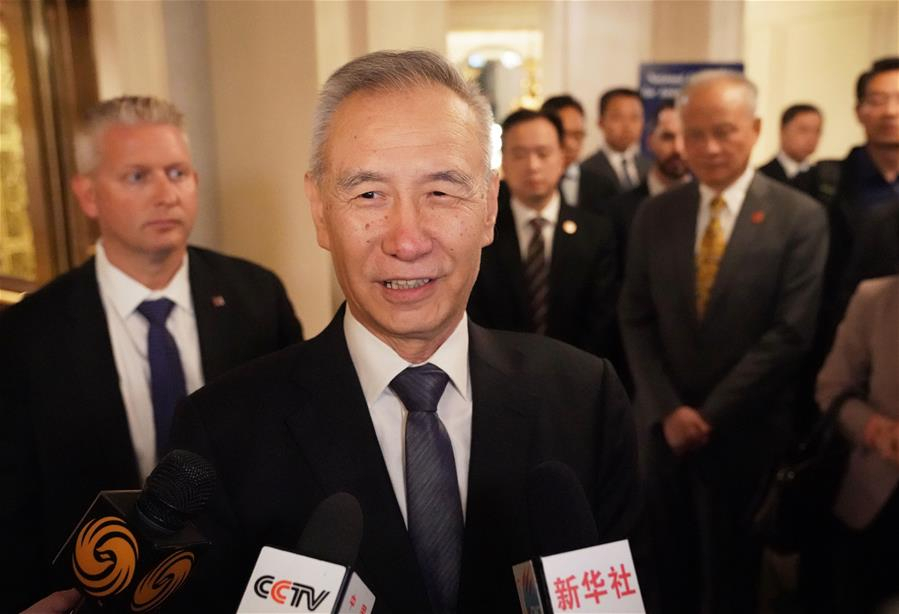
Opinion
11:41, 15-May-2019
Be it fight or talk, China is ready

Editor’s note: This is an edited translation from an editorial initially published on Qiushi in Chinese on May 14.
At the 11th round of Sino-U.S. high-level economic and trade consultations, the U.S. again resorted to the tactic of “maximum pressure” in an attempt to attribute the blame for a no-deal to China. China responded with rationality, composure and calmness. Be it fight or talk, China is ready.
There was commentary saying that China went to a “minefield” deliberately set up by the U.S. The Chinese delegation was full of sincerity and staunch principles when heading to the U.S. for the talks. Honesty and principle are consistently reflected in China's attitude.
China shoulders responsibility
In 1997, when the Asian financial crisis broke out, China withstood tremendous pressure to prevent the depreciation of the renminbi. It not only stabilized the Chinese economy but also helped many countries and regions out of the crisis. In 2008, in the face of the more overwhelming global financial crisis, China maintained its stable macroeconomic policies and actively carried out international cooperation, making essential contributions to the stability and recovery of the world economy.
In recent years, economic globalization has faced some headwinds. Unilateralism and protectionism have risen. China has been advocating for greater openness, inclusiveness, universal benefits, balance and win-win development. In the process, China has always shouldered responsibility.
China and the U.S. are the two largest economies in the world, and both hold strong sway on the world economy. The Sino-U.S. economic and trade frictions provoked by the U.S. have brought significant uncertainties to the development of and become a serious drag to the world economy.
“America First” cannot be pursued at the expense of other countries' interests, or worse, at the cost of interests of both other nations and America itself. The U.S. may fall into the holes it digs for others and struggle to get out.
China is honest
The purpose of consultation and negotiation is to resolve contradictions and differences. This requires the two sides to be sincere and respond to each other's primary concerns. China has adequately handled the disputes in the way of seeking common ground while reserving differences. China has responded to U.S. concerns with utmost sincerity and made strenuous efforts to stabilize bilateral economic and trade relations.

Chinese-made jackets are displayed for sale at a Manhattan department store in New York City, May 7, 2019. /VCG Photo
Chinese-made jackets are displayed for sale at a Manhattan department store in New York City, May 7, 2019. /VCG Photo
China has always welcomed and affirmed the U.S. willingness to cooperate, and sincerely communicated with it and rationally sought to solve the problem. For some U.S. accusations and demands, it has also calmly explained and responded with great patience, willing to make response and adjustments in good faith as long as principles were not compromised.
China has tried to prove its sincerity through action. To maintain healthy and stable Sino-U.S. relations and promote China's economic and social development, it has expanded imports and reduced tariffs on some products. This move demonstrated the country's sincerity. At a critical moment when the people were speculating about the possible breakdown of Sino-U.S. trade talks, the Chinese delegation went to the U.S. as promised. The Chinese team did not go there because they were "afraid" of anything but because they were full of sincerity.
What did the U.S. do? For more than a year, the U.S. has engaged in trade protectionism, discriminated against Chinese products, hindered the normal investment activities of Chinese enterprises in the U.S. under the pretext of "national security review," adopted many non-tariff barriers, abused trade relief measures, etc. In particular, its insistence on raising the tariffs to bully China into accepting an agreement by coercion has led to considerable obstacles to the negotiation process.
China has its own principles. It has responded to U.S. concerns and considered U.S. interests with the greatest sincerity, but the U.S. did not show a similar attitude or honesty in return. Instead, it has just made more accusations and put more pressure on China.
The opportunity for mutually beneficial cooperation needs to be grasped by both countries. China and the U.S. can only reach a mutually beneficial and win-win agreement based on mutual respect and equality and taking care of each other's reasonable concerns. China is full of sincerity. How sincere is the U.S.?
China is not aggressive
At the heart of Sino-U.S. economic and trade relations are mutual benefit and win-win cooperation. Since China became a member of the World Trade Organization, Sino-U.S. bilateral trade volume has increased exponentially. In 2018, the bilateral trade in goods exceeded 630 billion U.S. dollars, and bilateral investment totaled 240 billion U.S. dollars.
The development of Sino-U.S. economic and trade relations has contributed to the economic growth of the U.S., lowered the inflation level in the country, created a large number of domestic job opportunities, and brought real benefits to American consumers.

Traders work on the floor of the New York Stock Exchange in New York City, May 6, 2019. /VCG Photo
Traders work on the floor of the New York Stock Exchange in New York City, May 6, 2019. /VCG Photo
By 2017, the U.S. had set up 68,000 foreign-invested enterprises in China, with actual investment exceeding 83 billion U.S. dollars. The fast-growing Chinese economy has created substantial business opportunities for these American enterprises.
However, the U.S. government turned a blind eye to the benefits gained and provoked Sino-U.S. trade frictions under the pretext of a "U.S. trade deficit." A trade war is a self-mutilating way of punishing other countries and has never been won in history. In the 1930s, countries put up high tariff barriers. Was there a winner? For China and the U.S., whose industries are highly integrated, the cost of a trade war is set to be borne by both countries.
The additional tariffs imposed by the U.S. on Chinese goods are mostly a tax on U.S. consumers and businesses, which will directly affect U.S. consumption, investment, import and export, and the American people will have to "foot the bill."
In this regard, many American people know it very well. A report released by the Peterson Institute for International Economics pointed out that 95 percent of the Chinese goods subject to the tariff increase are spare parts and electronic components which are assembled into the final products "made in the U.S." Raising the tariffs on these products will harm American enterprises themselves. More than 150 trade associations in the U.S. have set up a lobbying campaign named "Tariffs Hurt the Heartland." The campaign stated that the 25 percent tariffs on Chinese goods would significantly harm U.S. farmers, enterprises and consumers, increase financial market volatility and cost one million domestic jobs.
How is it possible for the U.S. to gain more from the trade war than from cooperation? Given the intertwined nature of the two economies, the Americans who believe only China will be hurt and eventually lose out should hone their math skills to figure out who loses and who gains.
China won't buckle under pressure
Does "maximum pressure" really work for a major power like China? At least so far facts tell us: No!

Chinese Vice Premier Liu He receives an interview in Washington D.C., U.S., May 9, 2019. /VCG Photo
Chinese Vice Premier Liu He receives an interview in Washington D.C., U.S., May 9, 2019. /VCG Photo
China sincerely hopes that the two countries can solve the problem and reach an agreement through consultation. However, this does not mean that China is afraid of the U.S. or will "capitulate" and "be subdued" under maximum pressure and set principles aside to accept the U.S. unreasonable demands. China has always been reluctant to fight, but is not afraid to fight, and will fight when necessary.
The strength, resilience and room for maneuvers of China's economy must be well understood by the "China school" in the U.S. It is hoped that people with little knowledge of China will take a fresh look at the actual size of China today and refrain from looking down on the Chinese economy because of their limited understanding of China.
Consultation should be equal and should be based on mutual respect. While asking China to take care of its concerns, the U.S. turns a blind eye to China's core concerns, such as abolishing all additional tariffs to normalize bilateral trade, bringing the number of trade purchases in line with reality, and making the text of the agreement more balanced. The U.S. is arrogant and does not want to make any substantial considerations of China's concerns. It only unilaterally threatens China. If this is the case, how can a fair and dignified agreement be reached?
Over the past year or so, through "fighting" and "talking," the U.S. should have seen China's stamina in upholding its principles and bottom line. The Chinese people have a clear understanding of the purpose of economic and trade frictions provoked by the country. As a result, Chinese people have become more confident and united.
For future negotiations, no matter what kind of outcome is in store, China has made thorough preparation and developed response tactics. The sky will not fall as there is always a way out. If China and the U.S. reach an agreement, which is a scenario China welcomes and looks forward to, the two countries can continue to deepen their economic and trade relations. If the two countries fail to reach an agreement, China will not panic and will never give in on issues of principle and dignity.
The Sino-U.S. economic and trade issues are long-term, complex and cumbersome. It may become a norm for the two to resolve economic and trade frictions by talking while fighting. Everyone should get used to it. When facing a complicated situation, haste makes waste. China is ready for a protracted war.
(If you want to contribute and have specific expertise, please contact us at opinions@cgtn.com.)

SITEMAP
Copyright © 2018 CGTN. Beijing ICP prepared NO.16065310-3
Copyright © 2018 CGTN. Beijing ICP prepared NO.16065310-3